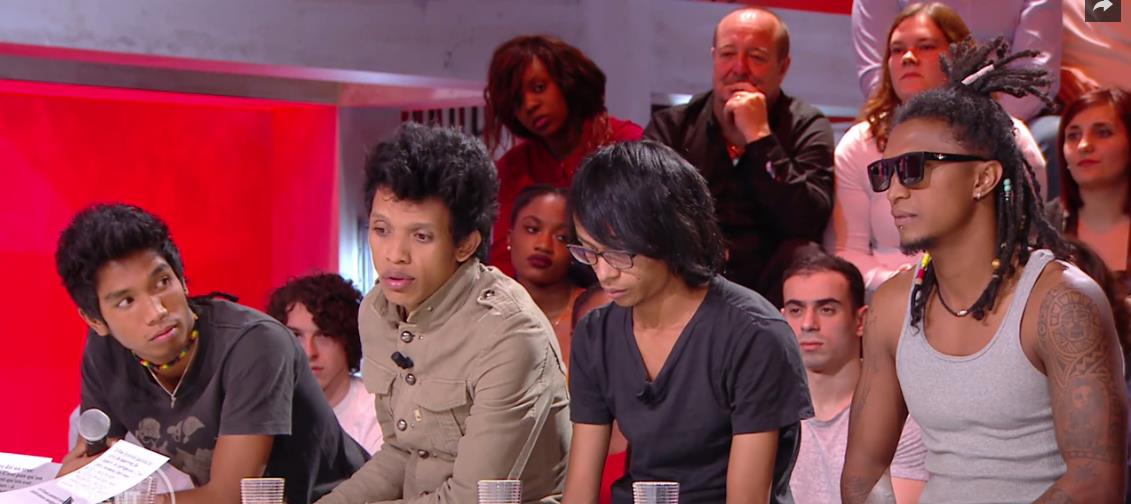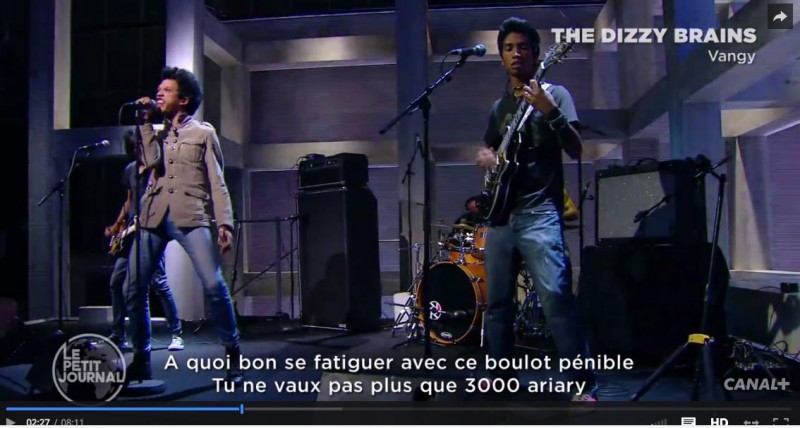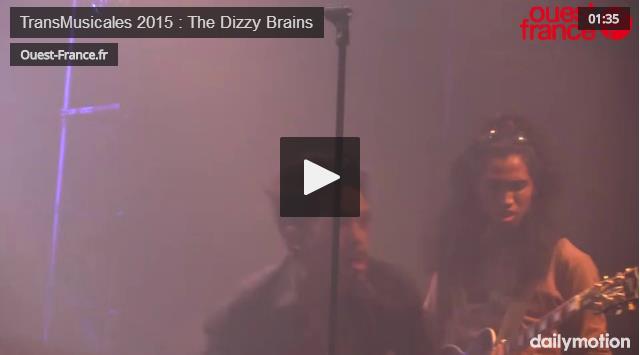 [1]
[1]The Dizzy Brains appeared on the French famous television show “Le Petit Journal,” which aired on CANAL+ 14/04/2016 in primetime. (Screen shot from the TV show)
A young rock group from Madagascar The Dizzy Brains [2] is capturing the imagination and attention of the music scene in Europe. The band's unique style is a blend of punk and garage rock and their provocative lyrics tell stories about politics, power and protest in Madagascar.
Since their songs challenge authority, the band was shunned from most concert venues and radio stations in Madagascar, but the band developed quite a following underground on social media and outside the country. They are currently touring Europe, with more than two dozens shows [3]planned this summer.
The Dizzy Brains grabbed audiences in France after their appearance [1] on the popular French television show “Le Petit Journal” [4] on April 14, 2016. During the show, one member of the band sparked a buzz on Malagasy social networks and blogs because he openly challenged Madagascar's new prime minister, urging him on to do more for the country: “just do your job, man [5]!” This bold and spontaneous plea was the talk of the town in Madagascar for a while and fitted quite well with the group's musical identity based on protest and civic engagement.
 [1]
[1]“What sense does it make to work a terrible job when you won't be worth 3000 Ariary (0.08 euros) to them ?” Screen shot of their performance on the TV show – “Le Petit Journal” aired on 14/04/2016 -
To get familiar with this unique group, here are three milestones about The Dizzy Brains that have stood out in their short yet already impressive careers.
Their beginnings
Brothers Eddy and Mahefa Andrianarisoa sing and play bass, while Poun plays the guitar and Mirana plays the drums. The group was founded in 2011 by the Andrianarisoa brothers. Their ear for rock music came from their father, an avid listener of 70s English punk rock such as the Kinks (a band also started by two brothers).
The Dizzy Brains’ first album, “Môla Kely,” was released in December 2013 and addresses the brothers’ lives growing up in endemic poverty and rampant corruption. One of their most famous songs, “Vangy,” provocatively expresses their anger [1] at living conditions they know too well:
A quoi bon se fatiguer pour un boulot pénible, tu ne vaux pas plus que 3000 Ariary, ce n’est même pas le prix d’une prostituée.
What sense does it make to have a terrible job when you won't earn more than 3000 Ariary; it's not even the price of one prostitute?”
Eddy explains why rock seemed to be the logical way to tell the world about censorship in Madagascar:
Faire du rock à Madagascar, ce n’est pas une carrière, ça ressemblerait même plutôt à un combat permanent. D’abord, dans la rue, tu te fais constamment racketter par les flics pour aller d’un point A à un point B. Ensuite, si tu veux jouer, tu n’as pas le choix. Il faut passer par l’underground et tenir bon. Tu dois te produire dans les petits bars de nuit, les cabarets assez glauques.
Making rock music in Madagascar is not a career, at this time, it's was more of an endless battle. Before, you would be stopped in the streets by the police for going from point A to point B. If you wanted to play music, you didn't have the choice. You had to go underground and wait. You had to play in small bars and shabby nightclubs.
Shunned by concert venues in Madagascar
Demanding and provocative lyrics didn't make the group many friends. Eddy explains the difficulties they experienced [6] in their home country:
On ne passe jamais à la radio ni dans les salles de concerts, parce que les gérants auraient trop peur d’avoir des problèmes après notre passage. On arrive quand même à se produire dans les bars. On se fait surtout connaître via les réseaux sociaux.
We were never played on the radio, never played shows, because the managers were too afraid of what would happen to them if we did. We played a lot in bars, and we were known mostly on social media.
Mahefa adds [6]:
Si tu tombes sur un programmateur de soirées cool, on te file l’équivalent de 100 euros pour tout le groupe. Mais le plus souvent, tu tombes sur un patron bourré. Lui va te laisser jouer dans un premier temps. À un moment il va quand même venir te dégager de la scène à coups de pied au cul si ce qu’il entend de ta musique ne lui plaît pas. On a connu ce genre de situations un peu borderline tout le temps. On est restés parmi les mendiants, d’accord, mais ça ne nous a pas empêchés de persévérer. Alors maintenant, quoi qu’il nous arrive, on a la peau dure.
If you happen upon a cool night club manager, you total 100 euros for the whole group. But more often, you find the managers drunk. He'll let you play the first time, and in a minute he'll kick your ass because he doesn't like your music. We were always running into these borderline situations. We waited around with beggars, but that didn't stop us from persevering. Now, whatever hits us, we have thick skin.”
International success
The Dizzy Brains’ style has always intrigued [7] Jean-Louis Brossard, the director of the Trans-Musicales festival in Rennes:
Ces gamins, donc, ils font du rock. Ils vont me mettre le feu, j’en suis persuadé. Parce que le rock, enfin ce qu’il véhicule de révolte contre quelque chose, ça a sans doute un peu perdu de son sens dans nos pays occidentaux. Alors que chez eux, à Madagascar, ce qu’ils chantent à un sens. Ça vient vraiment de la rue
These kids absolutely rock. They are going to make the fire, I'm sure of it. Because rock, in the end, is the vehicle of rebellion, and that's without a doubt a little lost in the West. While in Madagascar, what they're singing has meaning. This is coming from the streets!
The group captivated their audience in Brittany as they took the stage with the Breton flag:
The Dizzy Brains also shook the crowd at “Printemps de Bourges” a few months later, and hit a peak during their appearance on “Le Petit Journal.” With the recklessness of a group who has nothing to lose, the group sang with verve and floored Yann Barthès with their French speaking abilities.
The group continues to tour Europe and the young musicians continue to educate the world on their home country of Madagascar.
